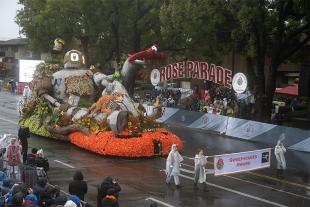Cal Poly Float Wins Crown City Innovator Award At 2024 Rose Parade
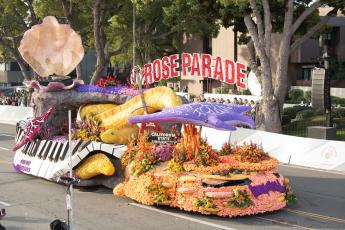
Cal Poly universities’ “Shock n’ Roll: Powering the Musical Current” float that depicts electric eels powering musical implements in a colorful undersea environment with massive manta rays, received the Crown City Innovator Award at the 135th Rose Parade® held New Year’s Day.
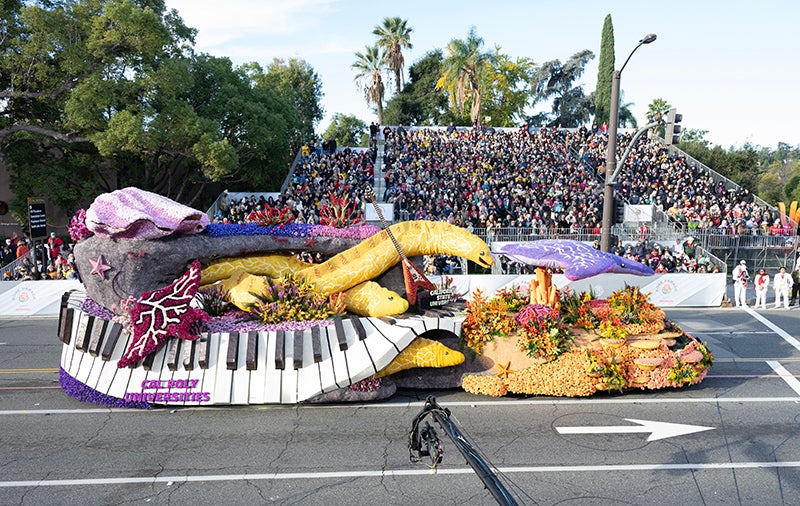
Cal Poly and California State Polytechnic University in Pomona teamed up for their 75th entry —the students’ rolling floral bouquet to the world.
“The Crown City Innovator Award recognizes innovations in technology and imagination and technology,” said Quinn Akemon, the Cal Poly team president. “This is the second time we’ve won it.”
The first was for the schools’ 2014 float, “Bedtime Buccaneers,” when students deployed about 1,800 individual vials for flowers at the front corners of the float to create the illusion of rippling waves. The animation covered 40 square feet and featured about 10,000 individual parts manufactured in-house.
“I feel like it’s really fitting for this year,” they added. “I mean, we really pushed ourselves this year go bigger, go better and to literally innovate.”
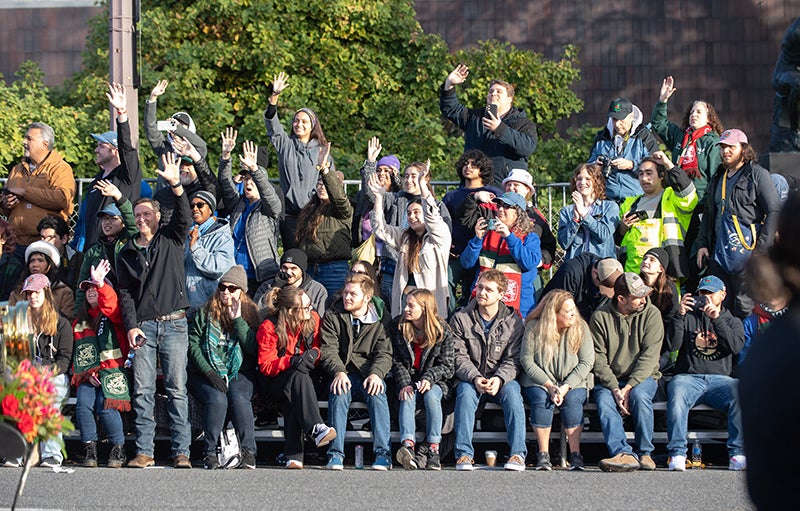
More than 60 students, equally split from each campus, worked to finish the float after the design was approved by Rose Parade® officials last spring. Workshops open to all Cal Poly students were held throughout the year.
The float is among the highest-profile student examples of Cal Poly’s Learn by Doing ethos.
Since the late 1940s, Cal Poly universities have produced the only student-built float in the Pasadena classic. This year is its 75th appearance making the schools the fourth oldest participant and the largest of the six self-built entries that include: the venerable city of South Pasadena (129 years); Sierra Madre Rose Float Association (92 years); Burbank (91 years); Downey (72 years); and La Cañada Flintridge (45 years).
Cal Poly universities’ 18-by-55-foot entry that rises to 25 feet tall exemplifies the parade’s 2023 theme of “Celebrating the World of Music.” Alex Aghajanian, the 2024 Tournament of Roses president selected it.
“In a world of different cultures, beliefs, hopes and dreams, one language unites us all — music,” said the Pomona campus alumnus (Business Administration, ’79) earlier this year.
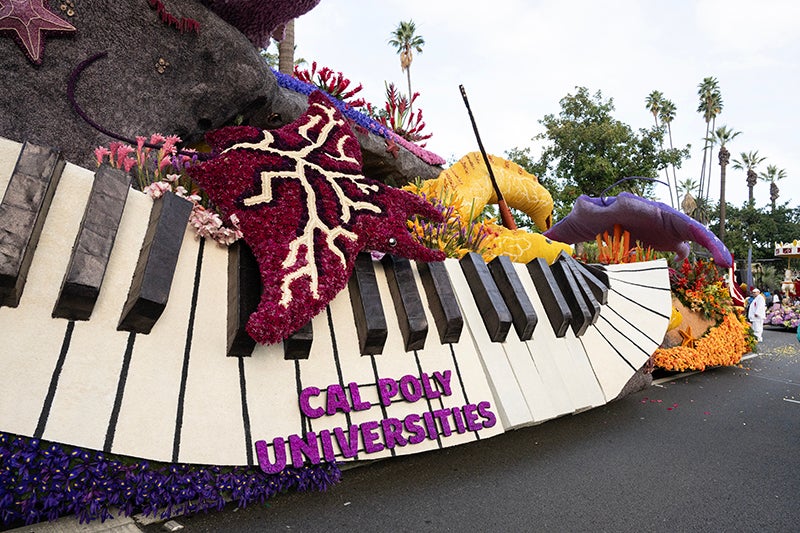
The eclectic “Shock n’ Roll” swims and swirls with a musical and electric current. It features a pair of rays and a trio of electric eels. The colorful award-winner dares viewers to try and look away. It tells the story of a detailed undersea community with larger-than-life creatures curiously living with electric instruments and musical implements — guitars, keyboards, a turntable and a speaker box — powered in a novel way.
At the float front, a giant manta wings its way along a coral reef. Behind, the large keyboard undulates across the sea floor, keys taping out the melody — Dengue Fever’s guitar-and synth-heavy instrumental “Lake Dolores.” One eel pokes out of a cave below the ivories, checking out still more denizens of the deep: anemones, starfish and urchins, while a smaller ray trails along the keys.
Rising above, the other electrified eels swim through a large coral-covered arch, powering two electric guitars and a speaker as well as a record spinning on clamshell-turntable resting atop the arch. Musically, these uniquely dynamic and energizing creatures ride the currents in harmony while providing a soothing seascape soundtrack.

About 20,000 flowers and a variety of other natural materials provide texture and “techni-colored materials” to bring this underwater world to life. The ocean floor, resembling a sunset-hued gradient, is adorned with encrusted coral covered in a mix of rich floral color. Gerbera daisies, roses, irises and protea (that Greek legend says were named after Proteus, the son of Poseidon, god of the sea) are intermingled with a variety of items commonly found on a grocery produce aisle — dragon fruit, cabbage, potatoes and onions — to create “an electrifying contrast of textures and colors that mirror the rich diversity of marine life,” according to the Rose Parade media guide.
The lead manta is covered with statice, also called sea lavender, a staple as a supporting player in mixed floral bouquets — purply petals carefully dried and processed on the two campuses. On the float stern, the turntable clam echoes the royal shade in a cloak of purple chrysanthemums, while the inner shell shines with pearlescent lunaria.
Guitars on the float are tufted with roses, in a color scheme that is an homage to the electric guitar showcased on Cal Poly universities’ 2019 outer-space-themed float, “Far Out Frequencies.”
Throughout this year’s entry, artfully designed floral displays give shape to coral formations, adding an extra layer of texture and vibrancy to the milieu.
To mimic the encrusted coral, students incorporated the rich hues of purple cabbage, dragon fruit and ornamental kale to create a stunning tableau found in tropical waters. Adding depth to this oceanic display are onions, yellow cauliflower and grapefruit, combined with the earthy tones of red kuri squash (a thin-skinned, orange-colored winter variety), beets and velvety-purple yams. Purple carrots, rich in antioxidants and believed to be the color of the first domesticated carrots, are splayed in spirals to achieve the intricate patterns of sea urchins.
The schools, which have pioneered various animation iterations since their first parade entry in 1949, bring plenty of action to their Zissouesque mise-en-scène for parade-goers crowded along the 5-1/2-mile route, from Orange Grove to Colorado to Sierra Madre boulevards, through the heart of California’s City of the Roses.
“We definitely shot for the moon with animations,” Akemon said. “Our massive manta ray, on the front, tilts forward and upwards while also having the wings flapping, so it looks like it’s diving and swimming through the air. All three eels have animations as well. One of the eels has two, the head moves, but it also has a thin ripple like a wave along the length of the dorsal fin, which is pretty cool.”
The piano keyboard that rolls out across the length of the float includes seven animated keys.
“We're really excited about that one because it uses pneumatics, and we haven't used pneumatics on the float in several years,” Akemon said. “Those piano keys also have very bright lights behind them, so they'll light up as well, which is really exciting. It’s been a couple years since we tried to do any lights on the float.”
In addition, on the back of the float a speaker’s subwoofer pulses in and out like its playing music, and the top of a large clamshell opens and closes revealing a turntable spinning a record featuring the number 75, honoring the schools’ latest appearance in the Rose Parade®.
The float includes new electronics to control movements of creatures and other float elements, “which is really exciting,” Akemon said. “So we’ve built a new animation control system. We have hydraulic animation, pneumatic animation and electric animation. And we have lights. We’re trying to sync our motion with music. We really went for it this year on animations.”
Cal Poly universities enjoy a rich history and tradition at the Pasadena parade. From 1938 to 1965, the campuses operated under a unified administration based in San Luis Obispo. In 1966, the state schools became separate state university campuses, but students continued the tradition to produce an entry for the Rose Parade® that is seen in person by hundreds of thousands, and watched by scores of millions more on national and international broadcasts.
Since Cal Poly’s first float — hastily assembled in 90 days for $258 in the waning days of 1948 — won its first honor, an Award of Merit on New Year’s Day 1949, entries have grown in size and sophistication. And along the way they’ve earned 61 awards, including the 2023 Extraordinaire Trophy, given to the creators of the parade’s most extraordinary float, including those 55 feet or larger.



